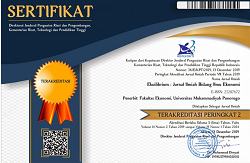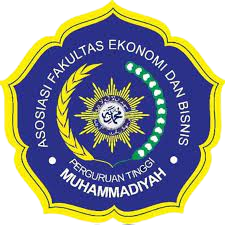Breastfeeding : Gender and Socio-Economic Dimensions
DOI: 10.24269/ekuilibrium.v13i1.2018.pp67-84
Abstract
This study aims to examine breastfeeding behavior from a gender perspective and socio-economic dimension. The legal basis and internal and external factors of breastfeeding behavior are the main issues. Breastfeeding views are also studied in terms of working women, in response to the increasingly expensive economic needs of women to help the family economy by entering the labor market, while women also have an obligation to engage in breastfeeding activities. This study uses literature method, by collecting all the literature related to the breastfeeding process, the legal basis that supports, and the factors that can inhibit and the way to succeed exclusive breastfeeding issues. This study found the fact that there is a misconception of society about breastfeeding that the breastfeeding process is not optimal, the modernization also makes women who should breastfeed to make new choices instead of breastfeeding obligations for their children.
Keywords
References
- Barker, D.K. (1999). Gender, in Peterson, J.; Lewis, M. (ed.): The Elgar Companion to Feminist Economics. Cheltenham: Edward Elgar Publishing Ltd.
- Departemen Kesehatan. (2014). Health Profile of Surakarta City. Available at: http://www.depkes.go.id/resources/download/profil/PROFIL_KAB_KOTA_2014/3372_Jateng_Kota_Surakarta_2014.pdf. Downloaded on January 7, 2017.
- Fakih, Mansour. (2002). The Collapse of Development Theory and Globalization. Yogyakarta: Insist Press dan Pustaka Pelajar.
- Figart, D.M. (1999). Theories of discrimination, in Peterson, J.; Lewis, M. (ed.): The Elgar Companion to Feminist Economics. Cheltenham: Edward Elgar Publishing Ltd.
- Heraty, Toeti Noerhadi. (2002). “About Gender Engineering and Bias” in Politics and Gender. Yogyakarta: Yayasan Cemeti.
- Hermayanti. (2010). Family Perception About Exclusive Breast Milk (ASI) Giving. Jurnal Saintika Medika 6: 12.
- Ihromi, Tapi Ormas. (1990). Mothers with Single Role and the Role Indonesia.
- Islami., H. Susanto, dan S. E. Rahayuningsih. (2013).
- Socio-Economic Status with Late Breastfeeding. JIKK Jurnal Ilmu Keperawatan dan Kebidanan 4 (1): 44-49. Available at http://ejr.stikesmuhkudus.ac.id/index.php/jikk/article/view/201. Downloaded on May 28, 2017
- Jennings, A. (1999). “Labor market, theories of”, in Peterson, J.; Lewis, M. (ed.): The Elgar companion to feminist economics. Cheltenham: Edward Elgar Publishing Ltd.
- Kementerian Kesehatan RI. (2016). Indonesia Health Profile 2015. Jakarta: Kementrian Kesehatan RI.
- Lazear, E.; Oyer, P. (2009). Personal Economics. Available at: https://faculty-gsb.stanford.edu/oyer/wp/handbook.pdf. Downloaded on June 14, 2012.
- Levy, Yair dan T. J. Ellis. (2006). A Systems Approach to Conduct an Effective Literature Review in Support of Information Systems Research. Informing Science Journal 9: 181-212. Available at: inform.nu/Articles/Vol9/V9p181-212Levy99.pdf. Downloaded on July 12, 2017.
- Lim, L.Y.C. (1983). “Capitalism, Imperialism and Patriarchy: The Dilemma of Third-World Women Workers in Multinational Factories”, in Nash, J.; Fernandez-Kelly, M.P. (ed.): Women, Men and the International Division of Labor. Albany: State University of New York Press.
- Matthaei, J. (1999). Patriarchy, in Peterson, J.; Lewis, M. (ed.): The Elgar Companion to Feminist Economics. Cheltenham: Edward Elgar Publishing Ltd.
- Mosse, Julia Cleves. (1993). Half the World, Half a Chance: An introduction to Gender and Development. Oxford: Oxfam. Translation by Hartian Silawati. Gender and Development. (2007). Yogyakarta: Pustaka Pelajar.
- Mutiaraningtyas, Rosyanti. (2013). Social Construction Exclusive Breast Milk For Career Women. Jurnal Komunitas 2 (2). Available at: http://journal.unair.ac.id/article_5542_media135_category8.html. Downloaded on May 2, 2017.
- Ningsih, Iriyanti. (2009). Selection of Infant Formula 0-6 Months Based on Nutrition Composition or Selling Price (Case Study at Dr. Moewardi Hospital Surakarta). Skripsi, published. Surakarta: Universitas Sebelas Maret. Available at: https://digilib.uns.ac.id/dokumen/detail/8268/Pemilihan-susu-formula-bayi-0-6-bulan-berdasarkan-komposisi-zat-gizi-atau-harga-jual-studi-kasus-di-Rumah-Sakit Dr.Moewardi-Surakarta. Downloaded on June 2, 2017
- Raharjo, Bambang Budi. (2015). Golden Momentum The Formation of Qualified Human Resource (Early Breastfeeding Initiation and Exclusive Breastfeeding in Kendal Community of Central Java). Disertation, published. Available at: http://repository.uksw.edu/handle/123456789/7053. Downloaded on February 12, 2017.
- Rejeki, Sri. (2008). Phenomenology Study: Exclusive Breastfeeding Experience of Working Mothers in Kendal Central Java. Jurnal Media Ners 2 (1): 1 – 13. Available at: http://ejournal.undip.ac.id/index.php/medianers/article/view/734. Downloaded on May, 7, 2017.
- Rowat and Rowat. (1994). When Husband Wife Works. Yogyakarta: Kanisius.
- Sotherland, Johana. (1999). Gender Concerny and The International Undertaking on Plan Genetic Recources. Development Bulletin no. 49, July 1999.
- Sugihastuti dan Itsna Hadi Septiawan. (2007). Gender and Infinity Women: Critical Practice of Feminist Literature. Yogyakarta: Pustaka Pelajar.
- Susanti, B.M. (2000). “Research on Women From an Androcentric View to a Gender Perspective. Jurnal ISI Yogyakarta.
- Umar, Halimah, H. M. T. Abdullah, L. Prawirodihardjo. (2013).
- Determinant Factors of Exclusive Breastfeeding on Working Mothers in the City of Parepare. Available at: http://pasca.unhas.ac.id/jurnal/files/ad194cfaf66e0a6e5a982e25a5855341.pdf. Downloaded on March, 23, 2017.
- Werdiyanti, Rina. (2013). Welcome to The Exclusive Club: Mother Working Breastfeedin. Yogyakarta: Familia.
- Whelehan, Imelda. (1993). Modern Feminist Thought: From the Secondwaveton “Post Modernism”. New York: New York University Press.
- Wibowo, Dwi Edi. (2011). Women's Double Roles and Gender Equality. Muwâzâh: Jurnal Kajian Gender 3 (1). Available at: http://e-journal.stain-pekalongan.ac.id/index.php/Muwazah/article/view/6. Downloaded on June 7, 2017.
- Widayati, Rina Sri. Wahyuningsih, Istiqomah Risa. (2016).
- Empowerment of Asi Exclusive Support Group in Excitement Exclusive Motion Movement. Warta LPM. Available at: journals.ums.ac.id/index.php/warta/article/download/1988/1393. Downloaded on March 13, 2017
- Woffman, B.R. (1995). The Role of Women. Yogyakarta: Kanisius.
- Zed, Mestika. (2004). Biblical Research Methods. Jakarta: Yayasan Obor Indonesia.
Refbacks
- There are currently no refbacks.

This work is licensed under a Creative Commons Attribution-ShareAlike 4.0 International License.













